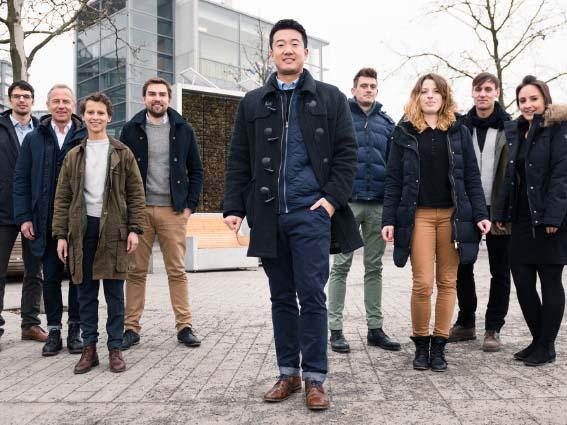CityTree: the air pollution startup with the purifying power of 275 trees
While governments grapple with legislation to stop people polluting, one German startup has come up with a way to clean the air in real time

Zhengliang Wu knows all about the dangers of air pollution. He rarely returns to his birthplace of Shanghai from Germany, where he lives. But he sees his mother and sister suffer each time they return from visiting his elderly grandmother in China.
“Every time they go back they get sick, it’s terrible,” the IT engineer and co-founder of Green City Solutions says down the phone from Berlin. He’s about to leave for Paris, where he will oversee the installation of two new CityTrees, a plant-based air filter as powerful as 275 normal trees, in 99 per cent less space.
The four co-founders of Green City Solutions - an architect, a horticulturalist, a mechanical engineer and Wu, the IT specialist - met at Dresden University and founded the startup in 2014. Together, they created the CityTree as part of the answer towards a complex problem: how to clean the air in the world’s increasingly overpopulated urban areas.
City dwellers suffer from asthma, heart disease and lung cancer because of the poor quality of the air where they live. The World Health Organisation says four in every five city residents face toxic levels of particulate air pollution: a combination of poisonous nitrogen dioxide and other carcinogenic particles. It’s not getting any better: the WHO says air pollution was eight per cent worse in 2013 than it was in 2008.
Yet social entrepreneurs tackling air pollution and other environmental issues often face huge barriers from corporate lobbying power and a lack of finance. Even when the governments attempt to introduce regulation, it can be thwarted by corporate greed just like in 2015, when regulators discovered that Volkswagen had been fixing the emissions figures for diesel cars.
While governments grapple with legislation and its enforcement, Wu has come up with a way to tackle air pollution in real time. Green City Solutions uses plants that are good at filtering air, like mosses and lichens, with a very large leaf surface compared to other plants, so that the leaves can absorb more pollution without it clogging up the surface. They attach the moss to air vents to speed up the cleansing process and collect data about types and levels of pollution where the CityTrees are installed.
Green City Solutions was able to develop the CityTree thanks to significant support from the German government and a private bank loan. As the company grew, it secured private investment and even won a couple of small prizes in Europe. In July 2017, it is in with a chance of winning its biggest competition yet as a finalist in the Chivas Venture. Judges must decide between 30 socially responsible enterprises gathered in Los Angeles for the chance to win $1m.
“Chivas is the biggest competition we have been part of,” Wu says. “It’s the first time we have a chance on a global scale to get that much money. They are connecting different startups worldwide and helping them make an impact.”
The competition includes eco-friendly stationery that funds education projects for women and girls, vertical reef mussel-farming technology and smokeless cooking technology that can be fuelled by twigs, cow dung, coconut shells and even the husk of a corn cob.
Many of the entrepreneurs in the final have come up with solutions to combat waste. There’s FOLO Farms, which collects food waste from hotels and restaurants and turns it into nutrient-rich compost, as an alternative to the pesticides that have wreaked destruction on the land in the company’s home country, Malaysia.

Or Recycle Points, a rewards system to encourage low-income families to recycle waste in Nigeria. The company employs young so-called "wastebusters" to go door to door on electric tricycles collecting recyclable waste such as plastic bottles, aluminium cans, newspapers and cartons. These items are then processed by unemployed women within the community, and sold on to recycling plants to use as raw materials for new products.
The UK is represented by Tessa Cook, co-founder of Olio, an app that connects people in a community with shops to help them share surplus food, rather than it going to landfill. Cook, the daughter of a farmer, knows first hand how much work goes into producing food, but also that up to half of it never gets eaten.
She says social enterprises need to make sure they are addressing a real problem to be effective. “This ensures the market is there and it’s big enough,” Cook says. “Be clear on why it’s your problem to solve because this ensures you have the passion and resilience that’s absolutely essential for any startup.”
Wu’s market at the moment, is often authorities keen to show that they are taking a progressive approach to air pollution. Anna Richardson, Glasgow city convener for sustainability and carbon reduction, said the installation of two CityTrees is part of Glasgow’s commitment to clean air.
“We have set a target of making Glasgow one of Europe’s most sustainable cities and the arrival of these installations is a massive boost,” she said after the installation of trees next to the Buchanan Bus Station on Killermont Street and outside the Gallery of Modern Art on Royal Exchange Square.
There are also CityTrees across Germany and in Macedonia, Oslo and Brussels, where one the size of a bus shelter is strategically positioned outside the Mont des Arts with benches for passers by to stop and breathe the fresh air.
“It’s my favourite CityTree,” Wu says. “It’s planted at a very popular spot and it’s very symbolic because it’s where the EU decision makers are sitting.”
But Wu has ambitions for CityTrees to become more than symbols that governments are taking action on the deadly issue of air pollution. He wants the CityTree to become part of a new climate infrastructure that prioritises the health of citizens above profit.
“We’re building a climate infrastructure,” he says. “We want to move in the direction where we have solutions for every application in the city, not just in the street but also attached to facades, integrated into the ventilation systems of buildings and in private homes.”
Join our commenting forum
Join thought-provoking conversations, follow other Independent readers and see their replies
Comments
Bookmark popover
Removed from bookmarks